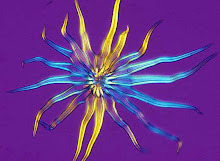.... numerous cuttlefish' bones' from common cuttlefish. These have been washed ashore in numbers all along the North East coast lately. I've found them on Warkworth beach in Northumberland recently and they've also been reported from the Yorkshire coast at Runswick bay.
There were plenty of the familiar common cockles, with the two valves of this one still joined by their ligament....
....... and some fine oyster shells.
I think this spindle-shaped whelk is the red whelk Neptunea antiqua rather than the common whelk Buccinum undatum.
An edible crab carapace
A cluster of slipper limpets Crepidula fornicata - you can read more about their bizarre sex life by clicking here
Common whelks Buccinum undatum - the lower image shows the operculum attached the the muscular foot, that seals the shell entrance when the foot is retracted.
Common starfish Asterias rubens, in an advanced state of decay
This strange object, again in an advanced state of decay, is the underside of a sun star, probably Crossaster papposus .....
... and these are the eggs of a common whelk, together with the bryozoan Flustra foliacea, also known as hornwrack (click here to see examples of living bryozoans)
But perhaps the most interesting stranding was this necklace shell, Polinices catenus, with its distinctive hollow spire ( known as an umbilicus) visible on the underside. The snail that lives in the necklace shell has a broad foot and uses it to plough through soft substrates, exposing buried bivalve molluscs whose shells it drills with its abrasive tongue. Its bivalve victims have a tell-tale, neat round hole in one of their valves..........
... like this banded wedge shell Donax vittatus
For more beachcombing, click here, here and here.







































No comments:
Post a Comment
Note: Only a member of this blog may post a comment.